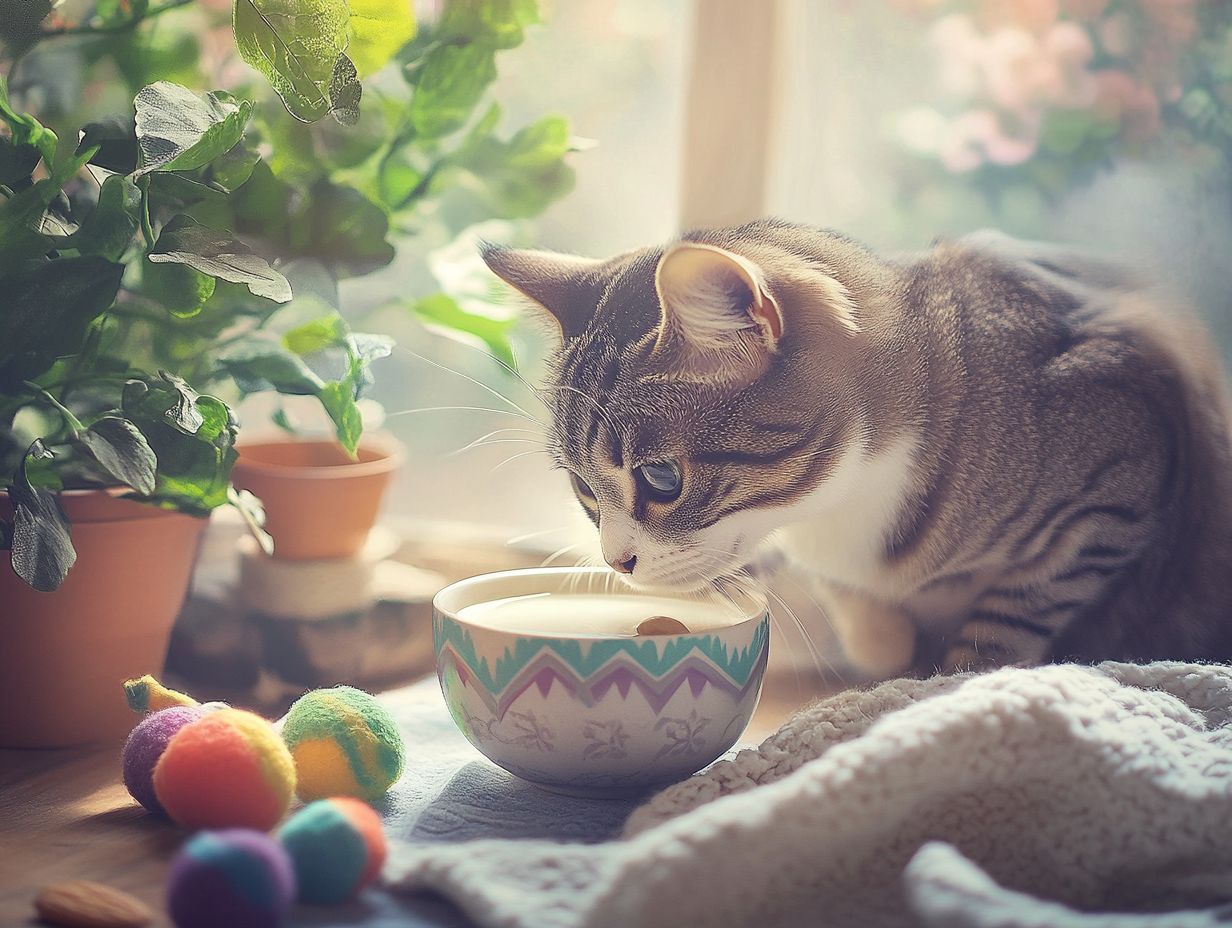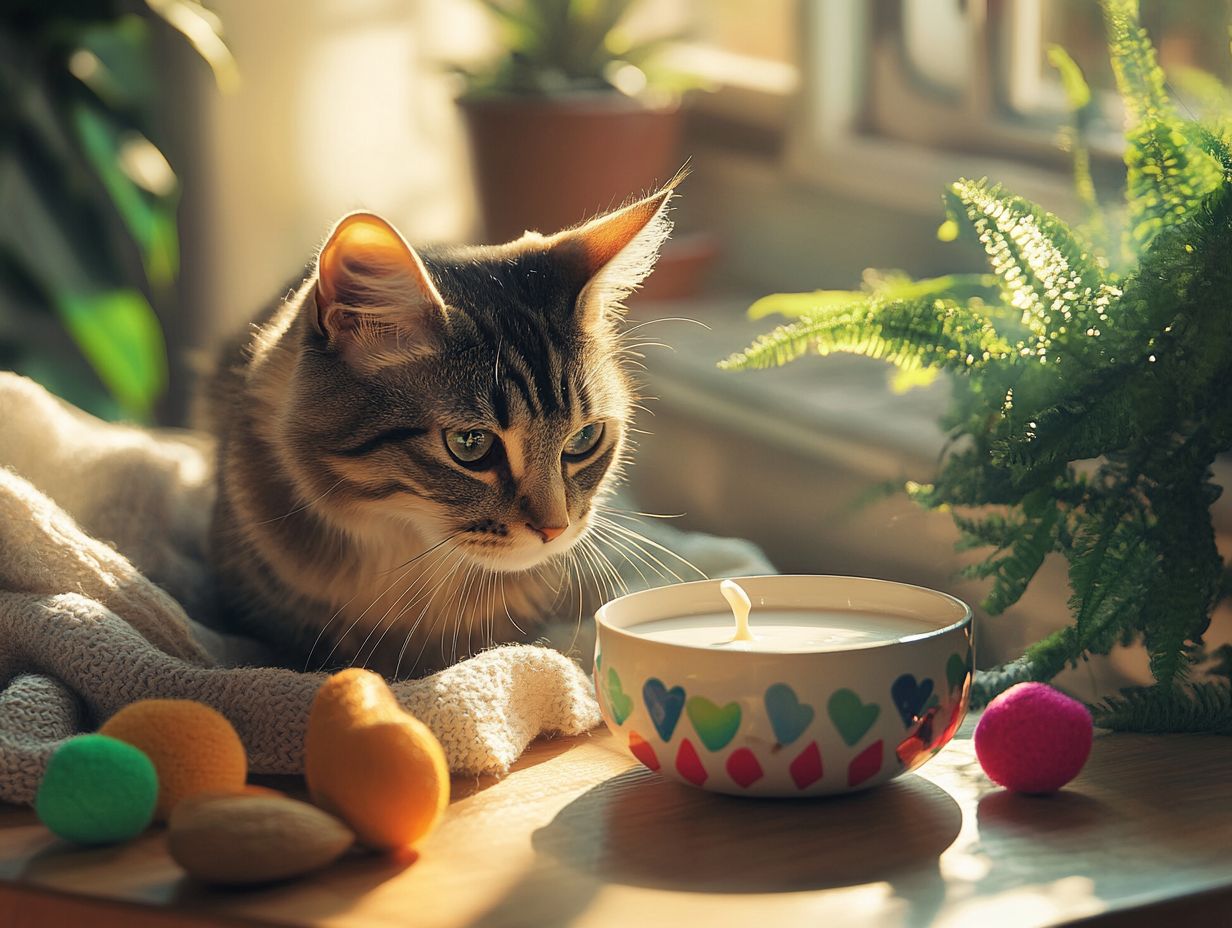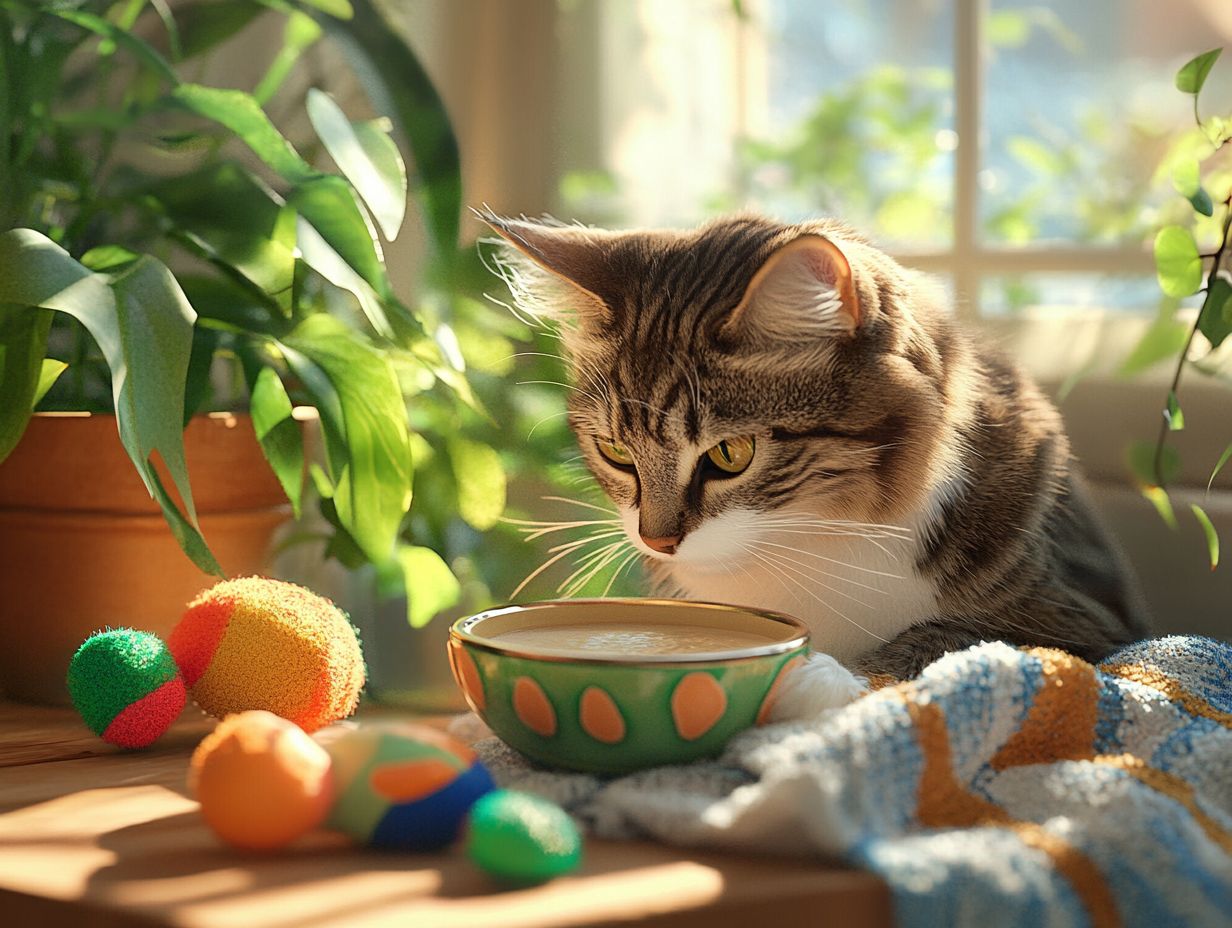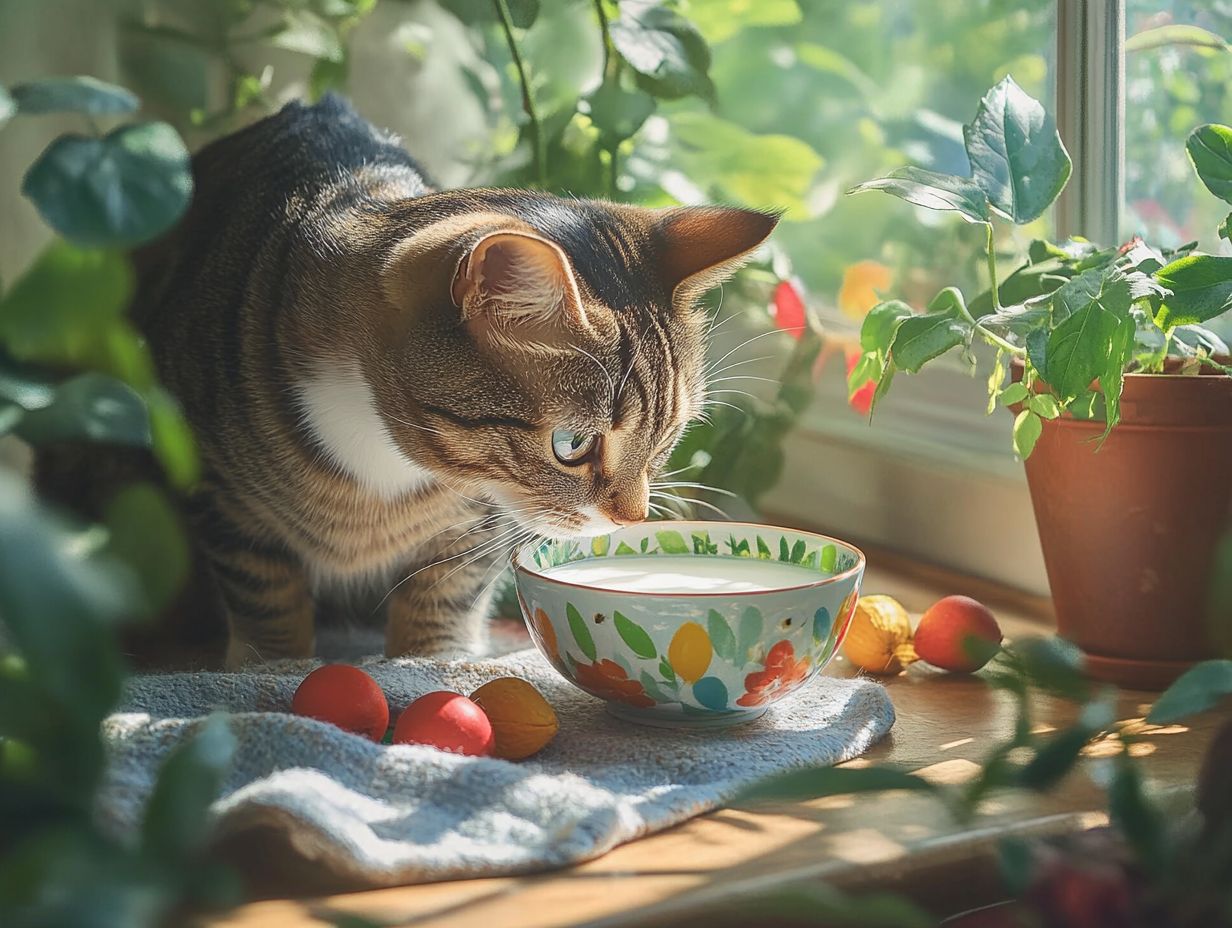Almond milk is not recommended for cats due to its potential health risks. While this plant-based beverage has gained popularity as a dairy alternative for humans, its effects on cats can be complicated, especially considering the risks of gastrointestinal problems, allergic reactions, and obesity.
This article explores what almond milk is, its potential risks and benefits for your feline companion, and whether it’s a suitable treat. We’ll also suggest safe alternatives like coconut milk and rice milk, and provide tips for introducing new foods to your cat while monitoring for allergic reactions, which may be covered by pet insurance.
Key Takeaways:

- Almond milk is made from almonds and water. It is not suitable for cats, as they need a diet high in protein and low in carbohydrates.
- Consuming almond milk can lead to gastrointestinal upset, allergic reactions, and potential weight gain. Stick to a balanced diet recommended by your veterinarian.
- Safe milk alternatives for cats include goat milk, lactose-free cow’s milk, coconut milk, and rice milk. Always consult your veterinarian before changing your cat’s diet.
Understanding Almond Milk
Almond milk is a plant-based beverage made from ground almonds and water. It serves as a versatile addition to vegan diets and is a valuable source of nutrition for humans.
As a dairy alternative, it offers a lactose-free option for individuals who are intolerant to dairy products. People often use it as a substitute for traditional dairy.
Enriched versions of almond milk can provide nutrients like calcium, vitamin D, vitamin E, potassium, and magnesium. However, always consider the artificial ingredients and potential health effects associated with sweetened varieties.
What is Almond Milk?
Almond milk is a non-dairy, plant-based product made by blending almonds with water, resulting in a creamy, milk-like consistency. It is often fortified with calcium, vitamin D, and sometimes lysine. This versatile milk serves as a substitute in recipes like smoothies, lattes, and baked goods.
It is commonly used in espresso coffee and chai tea, enjoyed worldwide. Most people prefer it in its unsweetened, unflavored form to minimize added sugars and calories.
However, almond milk is often sweetened and flavored to appeal to children and others who may not enjoy the nutty flavor of almonds. This dairy-free option is especially popular among health-conscious individuals who want to enjoy a tasty beverage while maintaining a healthy diet.
Can Cats Consume Almond Milk?
The question of whether cats can drink almond milk arises from their unique dietary needs. Cats require a meat-based diet to thrive; while almond milk contains low levels of lactose, it can still cause gastrointestinal issues.
Problems may worsen with large quantities or in its sweetened form. Pet owners should adhere to veterinary recommendations regarding almond milk. Moderate amounts might not harm cats, but excessive consumption can lead to negative outcomes, such as inflammatory bowel disease.
Potential Risks and Benefits for Cats

Almond milk can hydrate cats, but it should be given in moderation due to potential risks such as gastrointestinal irritation and allergic reactions. Some cat owners report that this creamy beverage helps improve hydration, particularly for reluctant drinkers.
Practical Feeding Guidelines
When introducing new foods to your cat, follow these tips:
- Gradually introduce almond milk in small amounts—start with just 1 teaspoon—to see how your cat reacts.
- Monitor for signs of allergic reactions, such as vomiting, diarrhea, or changes in behavior.
- Consult your veterinarian for recommended portion sizes of safe alternatives.
Conclusion
In summary, almond milk poses health risks for cats, including gastrointestinal issues and allergic reactions. It is essential to consult with your veterinarian before introducing any new food into your cat’s diet, including almond milk. Remember to prioritize your cat’s nutritional needs and consider safe alternatives.
Almond milk is generally not safe for cats and may cause symptoms like diarrhea and vomiting, particularly in those that are lactose intolerant or at risk of gastrointestinal diseases. Always consult your veterinarian before introducing any new food or drink to a cat, particularly when considering the inclusion of plant-based products.
This ensures the cat remains healthy while allowing the owner to understand the pros and cons of almond milk as a modern milk substitute.
Risks of Almond Milk for Cats
However, not all cats tolerate almond milk well. It is advisable to consult your veterinarian to ensure the safety of this product for your cat’s health.
Nutritional Benefits of Almond Milk
Almond milk contains some vitamins and minerals, such as vitamin E and magnesium, which can be beneficial; however, these should not be the primary source of nutrition for cats.
Alternatives to Almond Milk for Cats
Due to the complexities of feline nutrition, pet owners should explore alternatives to almond milk when seeking suitable milk options for their cats. Moderation is key, and these options should not replace a balanced diet.
Coconut milk, rice milk, and plant-based products such as tofu can offer safe and nutritious alternatives, provided there are no adverse reactions. It is important to choose unsweetened versions to avoid added sugars or artificial ingredients that could be harmful to a cat’s health.
Other Milk Options for Cats
Coconut milk and rice milk are two non-dairy options for cats that serve as lactose-free alternatives to regular milk. These alternatives help prevent the digestive issues that lactose can cause in cats while offering various nutritional benefits. However, it’s essential to be aware of potential allergic reactions and consult pet insurance options that cover dietary changes.
Coconut milk is rich in medium-chain fatty acids, providing a quick source of energy, whereas rice milk is a lighter option that some cats may find gentler on their stomachs. Start with 1 teaspoon of coconut or rice milk and monitor for any reactions.
When selecting a milk alternative, it is crucial to examine the nutritional profile to avoid deficiencies. Always opt for fortified products that contain essential vitamins and minerals to ensure the chosen alternative does not pose any health risks.
How to Safely Introduce Almond Milk to Cats
Always introduce new foods gradually. Almond milk can be safely introduced into a cat’s diet by offering small amounts and closely monitoring their reaction. It’s important to ensure that this new food aligns with their dietary needs and overall health.
Consulting your veterinarian for tailored advice can help prevent any negative side effects and confirm that almond milk is a suitable addition to your cat’s diet.
Tips for Introducing New Foods to Cats

When introducing new foods like almond milk to your cat, it is essential to do so gradually while closely monitoring for any negative changes in behavior or health. Start by offering a small amount of almond milk mixed with their regular food to help their digestive system adjust without becoming overwhelmed.
This approach makes it easier to identify any gastrointestinal issues, such as diarrhea or vomiting, or potential allergic reactions to almond milk. It’s crucial to observe your cat’s response; any signs of discomfort or abnormal behavior should prompt you to reconsider introducing the new food.
Consulting a veterinarian can provide guidance on the appropriate methods for introducing new foods to pets, ensuring a safe and successful transition that can enhance their diet.
Signs of Allergic Reaction in Cats
Allergic reactions in cats can be life-threatening if not identified and treated promptly. Therefore, pet owners should be vigilant for signs of allergies when introducing new foods, such as almond milk, into their cats’ diets.
Common indicators of allergic reactions in cats include:
- gastrointestinal issues like vomiting or diarrhea
- excessive scratching
- lethargy
These symptoms can serve as early warnings that a particular food may not be suitable for them. If you observe any of these symptoms, please contact your veterinarian immediately.
Identifying and Addressing Allergic Reactions
Quickly identifying and treating allergic reactions in cats can significantly reduce health risks and enhance their safety when introducing new foods, such as almond milk. It is essential for cat owners to remain vigilant, as allergies can be triggered by various factors, including environmental changes, new products, or dietary modifications. Consider consulting pet insurance providers that include allergy testing and cover treatments related to nutritional deficiencies.
Paying close attention to behavioral changes, such as increased scratching, grooming, or alterations in appetite, can be beneficial. Additionally, physical symptoms like rashes, swelling, and digestive disturbances should be carefully noted.
In summary, always consult your veterinarian before introducing almond milk or any new food into your cat’s diet to ensure their health and safety.
Can cats drink almond milk? While cats can ingest small amounts of almond milk, it is not recommended as a regular part of their diet due to potential health risks. Understanding the implications of almond milk on your cat’s health is essential for making informed dietary choices.
Potential Benefits and Risks of Almond Milk for Cats
If these symptoms arise, consulting a veterinarian is crucial. They can provide an accurate diagnosis, possibly through allergy testing, and recommend appropriate treatment options, which may include dietary adjustments or medications to alleviate symptoms and support recovery.
Can Almond Milk Be Harmful for Cats?
While almond milk is not toxic to cats, it can cause gastrointestinal issues such as diarrhea and upset stomach, especially if given in larger quantities. In fact, almond milk contains high amounts of fat that can lead to digestive problems and potential weight gain.
Why Is Almond Milk Not Recommended for Cats?
Cats need meat to be healthy, and almond milk does not contain the necessary nutrients that cats need for their overall health and well-being. It is crucial to avoid giving your cat almond milk, especially since it should not be confused with other nut milks that may contain harmful additives, like xylitol, which is toxic to cats.
What Should I Do If My Cat Accidentally Consumes Almond Milk?
If your cat has ingested almond milk, monitor them for any signs of discomfort or illness. Symptoms of xylitol poisoning or gastrointestinal distress should prompt immediate contact with your veterinarian. To avoid future issues, consider keeping almond milk away from your cat’s diet entirely. If you do choose to give your cat almond milk, limit it to no more than 1 teaspoon per week and monitor for any adverse reactions.
Are There Any Alternatives to Almond Milk for Cats?
Yes, there are many cat-friendly alternatives that provide better nutritional value, such as lactose-free cow’s milk, goat’s milk, or even plain water. Options like rice milk or coconut milk, which are low in lactose, can also be explored. It is always best to consult with your veterinarian before introducing any new food or drink to your cat’s diet, especially if your cat suffers from gastrointestinal diseases or inflammatory bowel disease.
Frequently Asked Questions
Can cats drink almond milk?

In summary, although cats can ingest small amounts of almond milk, it is not advisable due to the lack of essential nutrients and potential health risks. Always consult a veterinarian for dietary changes to ensure your cat’s nutritional needs are met.